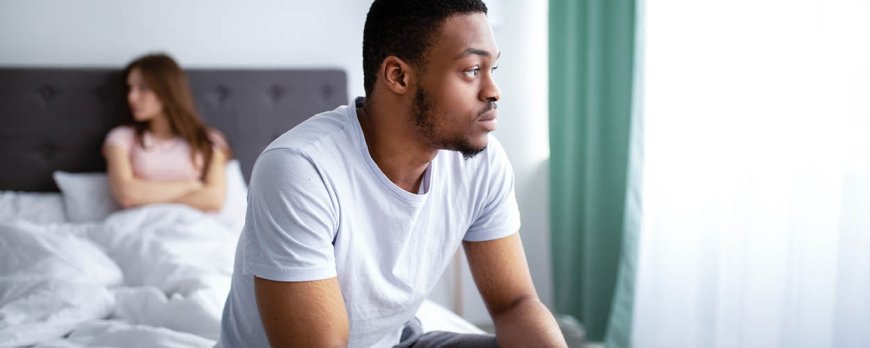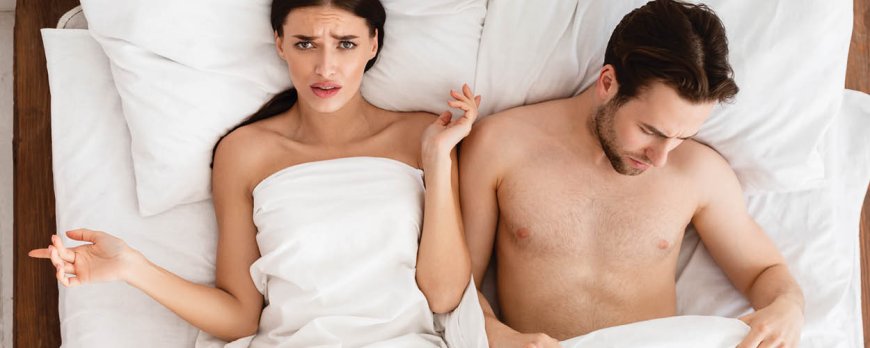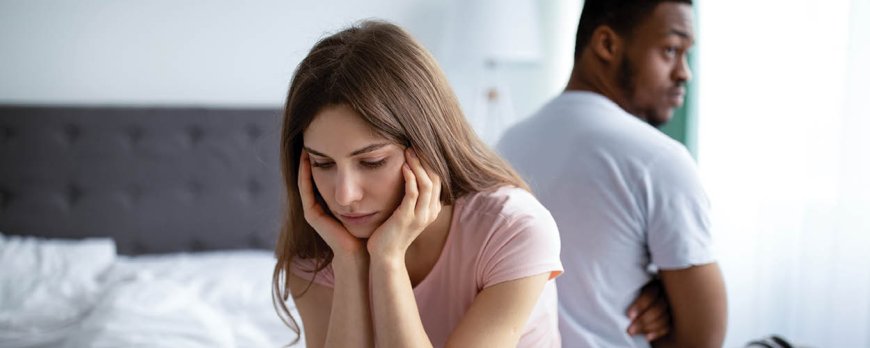What does low libido look like in men?
Explore 'What does low libido look like in men?' Understand the causes, signs, and impacts on relationships and self-esteem. Improve your intimate health today.

What does low libido look like in men?
Low libido in men refers to a decrease in sexual desire or interest and can have various causes and impacts. It is a common issue that can affect men of all ages and can significantly impact relationships and overall well-being. Understanding the signs and symptoms of low libido in men is crucial in order to seek appropriate help and find effective solutions.
Key Takeaways:
- Low libido in men refers to a decrease in sexual desire or interest.
- Various factors can contribute to low libido, including low testosterone levels, certain medications, sexual problems, depression, chronic illnesses, alcohol and drug use, lack of exercise, stress, low self-esteem, and relationship problems.
- Treatment options for low libido in men include testosterone replacement therapy, medication changes, lifestyle adjustments such as exercise and diet, and addressing underlying health issues.
- Low libido can have a significant impact on relationships and self-esteem.
- Addressing psychological factors, such as stress, depression, and relationship issues, is essential in managing low libido in men.
Understanding low libido in men
Low libido in men can be caused by a variety of factors, ranging from hormonal imbalances to psychological issues. It is important to understand these underlying causes in order to effectively address and treat the condition. One of the primary factors contributing to low libido is a decrease in testosterone levels. Testosterone is a hormone that plays a crucial role in sexual desire and function. When testosterone levels are low, it can lead to a decreased interest in sexual activity.
In addition to hormonal imbalances, psychological factors can also impact libido in men. Stress, depression, and relationship problems are common psychological issues that can contribute to a decrease in sexual desire. These factors can create a negative emotional state, causing a loss of interest in intimacy. It is important to address these psychological factors in order to improve libido and overall sexual well-being.
Other factors that can contribute to low libido in men include certain medications, chronic illnesses, alcohol or drug use, lack of exercise, and low self-esteem. Some medications, such as antidepressants and blood pressure medications, can have side effects that impact sexual desire. Chronic illnesses, such as diabetes and heart disease, can also affect libido. Lifestyle factors, such as excessive alcohol or drug use, lack of physical activity, and poor self-image, can further contribute to low libido.
When it comes to treating low libido in men, a comprehensive approach is often necessary. Testosterone replacement therapy may be recommended for individuals with low testosterone levels. Medication changes or adjustments can also be explored for those taking medications that affect libido. Making healthy lifestyle changes, such as incorporating regular exercise, improving diet, and reducing stress, can also have a positive impact on libido. Addressing underlying health issues, such as managing chronic illnesses or seeking therapy for psychological issues, is essential in improving overall sexual well-being.
Signs of low libido in men
Recognizing the signs of low libido in men is crucial for understanding and addressing the issue. Low sex drive can affect men of all ages and can have a significant impact on relationships and overall quality of life. Here are some common signs and symptoms that may indicate low libido in men:
- Reduced interest in sexual activity: Men experiencing low libido may find that their desire for sex has significantly decreased. They may have little to no interest in engaging in sexual activity.
- Difficulty achieving or maintaining an erection: Another sign of low libido can be the inability to achieve or sustain an erection. This can make sexual intercourse challenging and may lead to feelings of frustration or inadequacy.
- Decreased sexual fantasies: Men with low libido often experience a decrease in sexual thoughts or fantasies. They may have little desire for sexual stimulation and may not engage in self-pleasure as frequently as before.
It is important to remember that experiencing one or more of these symptoms does not automatically mean a man has low libido. These signs should be assessed in the context of a person's overall sexual health and well-being. If you or a loved one are concerned about low libido, it is advisable to consult a healthcare professional for a proper evaluation and guidance on treatment options.
When should you seek medical help?
If you are experiencing persistent or distressing symptoms of low libido, it is recommended to seek medical help. A healthcare provider can perform a thorough evaluation to determine the underlying cause and recommend appropriate treatment. Seeking help can lead to a better understanding of the issue and can provide options for improving sexual health and overall well-being.
While low libido in men can be a sensitive topic to discuss, it is important to remember that it is a common issue that can be addressed. With proper diagnosis and guidance, many men can experience an improvement in their sex drive and overall sexual satisfaction.

Impact on relationships and self-esteem
Low libido in men can strain relationships and have a negative impact on self-esteem, leading to feelings of inadequacy and frustration. When one partner experiences a decrease in sexual desire, it can create a disconnect and imbalance within the relationship. The partner with the lower libido may feel guilty or ashamed for not being able to meet their partner's needs, while the other partner may feel rejected or unwanted. This can create tension, resentment, and misunderstandings, ultimately putting a strain on the emotional connection between partners.
Additionally, low libido can take a toll on a man's self-esteem. Feeling like their sexual desire and performance are lacking can lead to feelings of inadequacy and diminished confidence. Men may question their masculinity and worry about their ability to satisfy their partner's needs. These negative emotions can seep into other areas of life, affecting overall well-being and causing further stress and anxiety.
How to address these impacts:
- Open communication: Talking openly and honestly with your partner about your concerns, worries, and desires can help build a stronger emotional bond and create a safe space for understanding.
- Seek professional help: Consulting with a healthcare professional, such as a urologist or therapist, can provide guidance and support in managing low libido and its impact on relationships and self-esteem.
- Couples therapy: Engaging in couples therapy can help partners navigate the challenges that arise from low libido, improve communication, and find solutions that work for both individuals.
- Focus on intimacy: While sexual desire may be lower, it doesn't mean that intimacy has to disappear. Finding alternative ways to connect emotionally and physically, such as cuddling, holding hands, or engaging in non-sexual activities that bring pleasure, can help maintain a strong bond between partners.
- Self-care and self-esteem boosters: Taking care of oneself through exercise, proper nutrition, and engaging in activities that bring joy and confidence can help improve self-esteem and overall well-being.
By addressing the impacts of low libido on relationships and self-esteem, individuals and couples can work towards finding solutions, reconnecting emotionally, and fostering a healthier and more fulfilling intimate life.
Treating Low Libido in Men
There are various treatment approaches for low libido in men, ranging from hormone therapy to lifestyle modifications. The right treatment option will depend on the underlying cause and individual circumstances. Here are some common strategies to consider:
- Hormone therapy: When low testosterone levels are identified as the cause of low libido, hormone replacement therapy may be recommended. This involves receiving testosterone through injections, patches, gels, or pellets to restore hormonal balance and improve sexual desire.
- Medication changes: If certain medications are contributing to low libido, a doctor may suggest alternative medications that have fewer sexual side effects. It's important to consult with a healthcare professional before making any changes to prescribed medications.
- Lifestyle adjustments: Focusing on lifestyle factors can help improve low libido. Regular exercise has been shown to boost testosterone levels and enhance sexual function. A balanced diet, stress management techniques, and adequate sleep can also have positive impacts on sexual desire.
- Addressing underlying health issues: Chronic illnesses, such as diabetes or heart disease, can contribute to low libido. Managing these conditions through appropriate medical care and lifestyle changes can help improve sexual function and desire.
- Exploring natural remedies: Some men find relief from low libido symptoms through natural remedies such as herbal supplements and dietary changes. It's important to discuss these options with a healthcare provider to ensure safety and effectiveness.
Remember, it's crucial to consult with a healthcare professional for accurate diagnosis and personalized treatment recommendations. They can help identify the underlying cause of low libido and tailor a treatment plan to address individual needs. With the right support and resources, many men can successfully manage and overcome low libido, improving overall sexual health and well-being.

Testosterone and Low Libido
Testosterone plays a significant role in male libido, and low levels can contribute to a decrease in sexual desire and function. When testosterone levels are low, men may experience a variety of symptoms, including reduced interest in sex, difficulty achieving or maintaining an erection, or a decrease in sexual fantasies.
Factors that can contribute to low testosterone levels in men include:
- Age: Testosterone levels naturally decline as men get older.
- Chronic illnesses: Conditions such as diabetes, obesity, and heart disease can affect testosterone production.
- Medications: Certain medications, including some antidepressants and opioids, can lower testosterone levels.
- Lifestyle factors: Poor sleep, lack of exercise, and excessive alcohol or drug use can all impact testosterone production.
If you suspect low testosterone levels may be contributing to your low libido, it is important to consult with a healthcare professional. They can perform a blood test to measure your testosterone levels and recommend appropriate treatment options.
Addressing psychological factors
Psychological factors can significantly impact male libido, and understanding and addressing these issues is crucial for improving sexual health. Several psychological factors can contribute to low libido in men, and recognizing them is the first step towards finding effective solutions. Here are some common psychological factors that influence low libido:
- Stress: High levels of stress can negatively impact sexual desire and performance. It can affect hormone levels, disrupt the mind-body connection, and lead to anxiety and fatigue, all of which can contribute to low libido.
- Depression and anxiety: Mental health conditions such as depression and anxiety can have a profound impact on sexual desire and function. The psychological distress associated with these conditions can cause a decrease in libido.
- Relationship issues: Difficulties within a relationship, such as lack of communication, unresolved conflicts, and emotional distance, can affect sexual intimacy and desire. Relationship problems can create emotional barriers that dampen sexual interest.
To address these psychological factors and improve libido, it is important to seek professional help. Consulting with a therapist or counselor who specializes in sexual health can provide guidance and support in navigating these challenges. They can help individuals and couples develop strategies to manage stress, address mental health concerns, and improve communication and intimacy within a relationship.
In addition to therapy, engaging in stress-reducing activities, practicing relaxation techniques, and maintaining a healthy lifestyle can also contribute to improving libido. Regular exercise, proper sleep, a balanced diet, and open communication with a partner can help reduce stress, boost self-esteem, and enhance overall sexual well-being.
Coping with low libido and erectile dysfunction
Low libido and erectile dysfunction often go hand in hand, and finding effective strategies for managing both is essential for overall sexual well-being. If you are experiencing a decrease in sexual desire and difficulties in achieving or maintaining an erection, here are some approaches that may help:
- Communicate openly with your partner: Discuss your concerns and feelings with your partner in a supportive and understanding manner. Open communication can help reduce anxiety and strengthen your emotional connection.
- Seek professional help: Consult with a healthcare professional or a specialist in men's sexual health. They can provide valuable insights, perform necessary tests, and recommend appropriate treatment options tailored to your specific needs.
- Consider medication options: There are medications available that can help address both low libido and erectile dysfunction. Your healthcare provider can guide you in choosing the most suitable medication and dosage for your situation.
- Explore therapy or counseling: Psychological factors, such as stress, depression, or relationship issues, can contribute to low libido and erectile dysfunction. Therapy or counseling can provide tools to manage these factors and improve sexual well-being.
Remember that finding the right approach may take time and patience. It is essential to address both the physical and psychological aspects of low libido and erectile dysfunction. By working closely with healthcare professionals and being proactive in seeking help, you can take steps towards improving your sexual health and overall well-being.

Conclusion
Low libido in men can have various causes and impacts, but with the right understanding and treatment, it is possible to improve intimate health and overall well-being.
Low libido in men refers to a decrease in sexual desire or interest, which can occur due to a combination of physical and psychological factors. It is important to recognize the signs and symptoms of low libido, such as a reduced interest in sexual activity, difficulties achieving or maintaining an erection, and a decrease in sexual fantasies.
Treatment options for low libido in men include testosterone replacement therapy, medication changes, lifestyle adjustments, and addressing underlying health issues. Testosterone replacement therapy can be beneficial for individuals with low testosterone levels, while medication changes may be necessary for those experiencing side effects from certain medications. Lifestyle adjustments, such as regular exercise and a healthy diet, can also contribute to improving libido. Additionally, addressing underlying health issues, such as depression or chronic illnesses, can help to alleviate low libido.
It is important for individuals experiencing low libido to seek help and support from healthcare professionals. Open communication with partners is also crucial in navigating the impact of low libido on relationships, as it can often lead to feelings of frustration and decreased self-esteem. By addressing the underlying causes and seeking appropriate treatment, individuals can take proactive steps towards improving their intimate health and overall well-being.
FAQ
What does low libido look like in men?
Low libido in men refers to a decrease in sexual desire or interest.
What are the causes of low libido in men?
Low libido in men can be caused by various factors, including low testosterone levels, certain medications, sexual problems such as erectile dysfunction, depression, chronic illnesses, alcohol and drug use, lack of exercise, stress, low self-esteem, and relationship problems.
What are the signs of low libido in men?
Signs of low libido in men may include reduced interest in sexual activity, difficulty achieving or maintaining an erection, decreased sexual fantasies, and overall decreased sexual drive.
How does low libido impact relationships and self-esteem?
Low libido in men can have a significant impact on relationships and self-esteem, causing emotional and psychological distress for both individuals and their partners.
What are the treatment options for low libido in men?
Treatment options for low libido in men include testosterone replacement therapy, medication changes, lifestyle adjustments such as exercise and diet, and addressing underlying health issues.
What is the relationship between testosterone and low libido in men?
Low testosterone levels can contribute to a decrease in sexual desire in men. Treatment options for low libido related to low testosterone may include testosterone replacement therapy.
How can psychological factors influence low libido in men?
Psychological factors such as stress, depression, and relationship issues can play a role in low libido in men. Addressing these underlying psychological factors is essential in managing and treating low libido.
What is the link between low libido and erectile dysfunction?
Low libido and erectile dysfunction often co-occur in men. Understanding and managing both conditions is crucial, and seeking appropriate medical help is recommended.
How should I cope with low libido and erectile dysfunction?
Coping with low libido and erectile dysfunction involves seeking appropriate medical help and considering treatment options. It is important to communicate openly with your partner and healthcare provider to find the best course of action.


































































































































